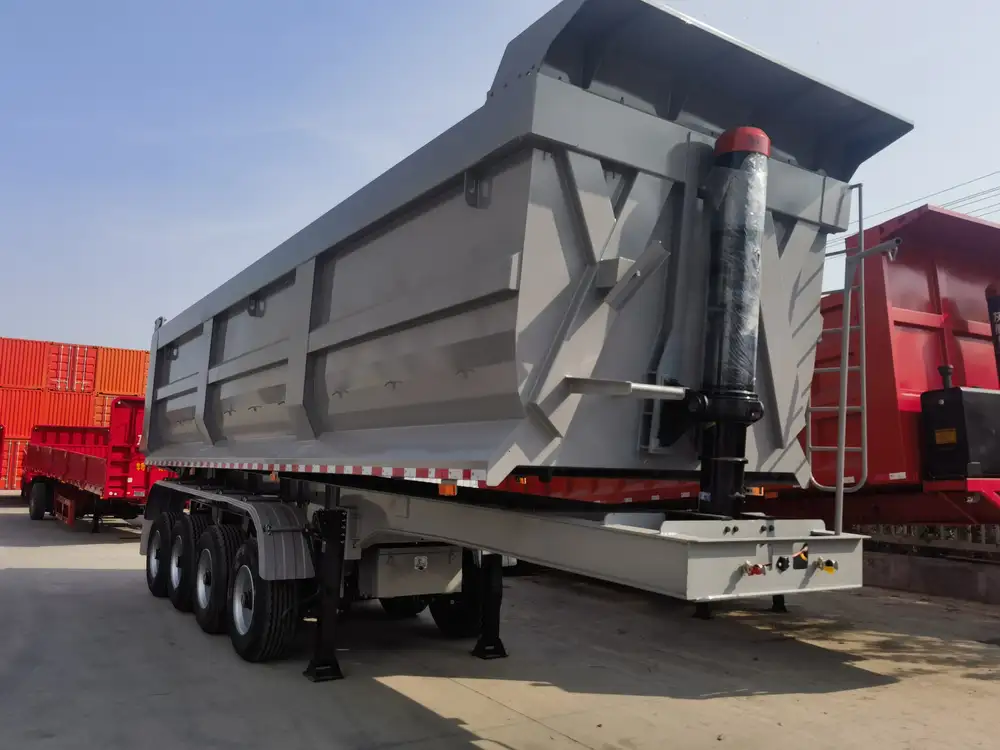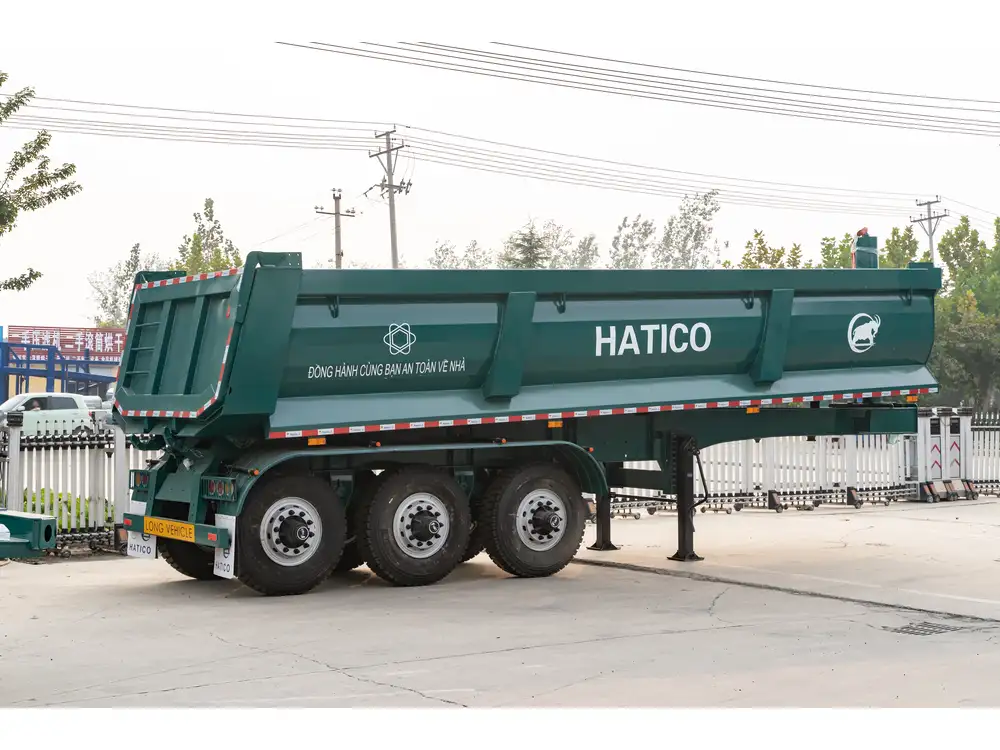Shipping a dump trailer effectively and economically requires understanding various factors that influence costs. As a manufacturer with extensive industry knowledge, we aim to demystify the costs associated with shipping dump trailers while providing insightful strategies to ensure value for your investment.
Understanding the Shipping Landscape
Before diving into specific costs, it’s essential to comprehend the various modes of transport available for shipping dump trailers, along with their advantages and drawbacks.
| Transport Mode | Advantages | Drawbacks |
|---|---|---|
| Flatbed Trucks | Easy loading/unloading; versatile for sizes | Exposed to weather; requires skilled handling |
| Enclosed Trailers | Protection from elements; lower theft risk | Higher shipping costs; limited to specific sizes |
| Container Shipping | Ideal for international transport; secure | Slower process; may require reloading at ports |
| Rail Transport | Economical for long distances; energy-efficient | Limited accessibility; longer transit times |
By familiarizing ourselves with these modes of transport, we can make informed decisions that align with our logistical needs and budget.
Factors Affecting the Cost of Shipping a Dump Trailer

1. Distance & Location
The primary factor in determining shipping costs is the distance between the origin and destination. Geographic locations can have a significant impact on expenses. For instance, shipping from urban centers may be cheaper than from remote areas due to better accessibility for transportation.
2. Weight and Dimensions
A dump trailer’s total weight and dimensions directly correlate with shipping costs. Generally, heavier and larger trailers incur additional fees due to:
- Increased fuel consumption: Larger loads require more energy to transport.
- Special equipment: Oversized trailers may necessitate specialized equipment or permits, adding to the overall fees.
3. Shipping Methods
The mode of transport, as touched upon earlier, plays a crucial role in the overall shipping cost. Each method has its pricing structure influenced by factors such as fuel prices, driver wages, and logistics management.

4. Seasonal Fluctuations
Shipping rates can be exceptionally volatile throughout the year. During peak seasons, such as spring and summer, demand surges, which can inflate costs. Conversely, winter may see reduced prices but also delays or challenges due to inclement weather.
5. Insurance & Additional Fees
While it’s often viewed as an extra cost, obtaining shipping insurance is vital for safeguarding your investment against potential damage during transport. Other fees may include:
- Loading/unloading charges
- Fuel surcharges
- Tolls or permit fees
6. Condition and Modifications of the Trailer
The condition of the trailer plays a pivotal role. A new or well-maintained trailer can typically withstand the rigors of transportation better than an old, worn-out one. Moreover, custom modifications may affect the shipping process, necessitating additional handling care and potentially elevating costs.

Estimating Dump Trailer Shipping Costs
To help frame our understanding, it’s crucial to consider estimated costs in a structured way. Below is a breakdown of estimated shipping costs based on varying distances and factors highlighted above.
| Distance (Miles) | Average Cost | Comments |
|---|---|---|
| 0-100 | $200 – $600 | Short-range; many local carriers available |
| 100-500 | $600 – $1,200 | Moderate range; cost-effective options abound |
| 500-1,000 | $1,200 – $2,500 | Long-distance shipping demanding diligence |
| 1,000+ | $2,500 and up | International shipping; complexity increases |
Note: These are general estimates and can vary based on individual circumstances.
How to Choose the Right Shipping Provider
Choosing the right shipping provider can drastically affect the overall experience and cost efficiency. Here’s a list of criteria to consider when selecting a partner for shipping your dump trailer:
Reputation and Experience: Research the provider’s history in the industry. Examine reviews, ratings, and testimonials to ensure they have experience handling similar loads.
Licensing and Insurance: Ensure the shipping company is licensed and has adequate insurance coverage. This protects against potential loss or damage during transit.
Cost Transparency: Look for providers who offer clear and upfront pricing, avoiding companies with hidden fees.
Service Range: Evaluate whether the provider can handle different transport modes, especially if your shipping needs may evolve.
Communication: Effective communication during the entire shipping process minimizes misunderstandings and ensures timely updates.
Tips for Reducing Shipping Costs
While shipping a dump trailer involves various unavoidable costs, several strategies can help minimize expenses:
Plan Ahead: Scheduling your shipment during off-peak seasons can lead to substantial savings.
Compare Quotes: Obtaining multiple quotes from different shipping providers helps identify competitive pricing.
Consider Consolidation: Combining shipments with other loads can lead to shared costs, making it cheaper to transport multiple trailers.
Negotiate: Many shipping companies are open to negotiation; don’t hesitate to discuss rates and services.
Explore Backhauling Options: Some carriers may offer reduced rates on backhauls, where they transport your trailer while returning from a previous delivery.

Common Questions About Shipping Dump Trailers
While we have explored various aspects of shipping costs, let’s address some of the frequently asked questions that can benefit potential shippers:
What size dump trailer is easiest to ship?
Typically, small to mid-sized dump trailers (up to 10,000 lbs and within standard dimensions) are easier and less expensive to ship. Oversized and heavier models require special handling and permits, elevating costs.
How do I prepare my dump trailer for shipping?
- Clean the trailer thoroughly to prevent the transfer of debris or contaminants.
- Check all components (lights, brakes, tires, etc.) for proper operation to avoid last-minute complications.
- Secure all loose items to prevent damage during transport.

What is the potential turnaround time?
Shipping times can vary significantly based on distance and transport method. Generally, expect local shipments to take 1-3 days, while longer distances may require 5-10 days or more, especially for longer hauls or international shipping.
Are there any limitations on shipping dump trailers internationally?
Yes, importing and exporting dump trailers may involve specific regulations and tariffs. Checking compliance with both the origin and destination country’s rules is fundamental to avoid delays or additional fees.
Conclusion: Maximizing Value in Your Shipping Process
Shipping a dump trailer can be a complex process influenced by multiple variables, from distance and weight to the choice of transport. However, understanding these factors allows you to navigate the shipping landscape efficiently and strategically. By employing careful planning, diligent provider selection, and cost-saving tactics outlined above, we can ensure a smoother, more cost-effective transport process.
In summary, recognize that every shipping scenario presents unique challenges and opportunities. With determination and the right insights, you can achieve a rewarding shipping experience that upholds the quality and integrity of your dump trailer investment.



